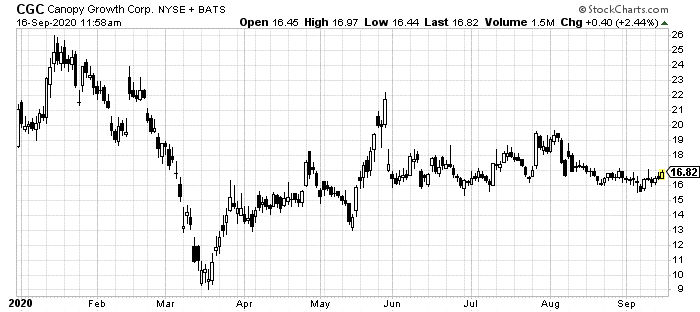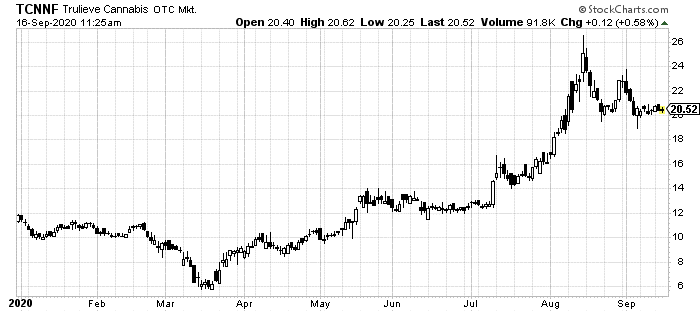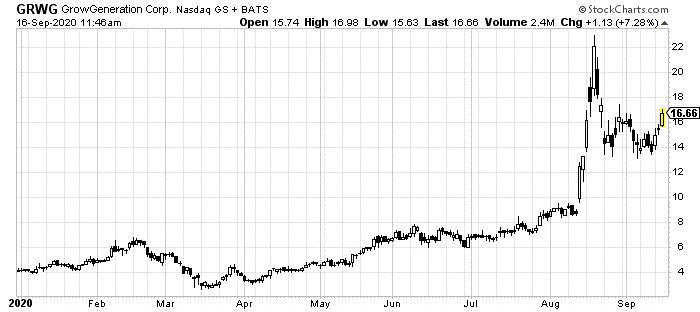Marijuana in the United States is an issue that never seems to go away nor get resolved.
Yet, so much is riding on actual federal action on the topic.
For starters, even though still federally prohibited, cannabis is a multibillion industry. Our neighbors to the north have it at their fingertips. Many states do too.
But the companies actually working in this industry can’t use banks, take out loans or sell across state borders.
And while it is tempting to say that is changing, it would also be a bit misleading.
There has been a slew of positive news over just the last few weeks about opening up pot in the U.S. though.
So now, just two months from election day, is a perfect time for a breakdown of where this controversial prohibition stands in the U.S.
In the race for the Presidency, we already have some clear statements on the topic of cannabis.
Despite some rhetoric during his 2016 run, President Trump has not budged on pot. From his first Attorney General, Jeff Sessions, we saw where marijuana laws would go, at least at the federal level.
Since Sessions’ ouster, the Trump Administration has continued to block or outright ignore the serious issues this booming industry faces.
Just a month ago, Trump himself told Republicans to try and keep marijuana legalization initiatives off the ballots this November for fear it would rejuvenate Democratic turnout.
Now, that’s not to say the man himself is opposed to marijuana at all. But, after nearly four years, we do have a clear picture that for many reasons – political and otherwise – the status quo is likely to remain.
On the other side of the ticket is Biden and Harris. Biden, in early Democratic debates, stood pretty much alone on also keeping the status quo. He has called for more studies and no policy changes.
Harris, on the other hand, has moved much further on this position than anyone else in the race. Only a few years ago, she was where Biden is today. In other words, she wasn’t against opening up marijuana laws. But she wasn’t ready for a full federal legalization.
But last year she did change. She introduced a bill that would remove marijuana from its Schedule I status. This would open up a huge amount of options for the industry. Banks would be free to complete deals, offer loans and simply bring dispensaries into the banking system itself.

Grab a piece of paper and pen to write this down…
Because you’re about to see the name and ticker symbol of the ONLY 5G STOCK every investor should own.
You can get the name and ticker of this company right here, no strings attached. But you better act fast…
Because the Federal Communications Commission, the government agency in charge of 5G, just scheduled a major announcement that would send shares soaring once announced.
Don't miss out. Click Here to Get #1 5G play for 2020 before the next market close.
Then, earlier this week, Harris gave another answer that sounds similar. But you can spot the difference.
She told ABC that “Under a Biden-Harris administration, we will decriminalize the use of marijuana and automatically expunge all marijuana-use convictions, and end incarceration for drug use alone.”
Notice what’s missing there. The all-important phrase “Schedule I drug” is completely absent.
Since joining the ticket, Harris has stayed away from that specific part of this subject. And while it does appear Biden can bend on this issue just as he did on same-sex marriage during his last Administration, Harris hasn’t forced it through just yet.
Of course, no matter who wins the White House in November, we still live in a Republic, with two houses of Congress. This is where we’re more likely to see some shift in marijuana policy.
Democrats in the House announced last month that this month, they’d be voting on legalization. With two-thirds of the population in favor of legalization, this is not that surprising.
Of course, it also wouldn’t be the first time the House passed something just for the Senate to ignore it. But it is a story worth following.
And despite the Senate’s “graveyard” status of late, it isn’t without its own proponents of easing federal laws.
In fact, the most important Senator has been somewhat on the fence.
Senate Majority Leader Mitch McConnell was instrumental in passing the 2018 Farm Bill that legalized hemp, the low-THC version of cannabis. That, in turn, opened up the CBD market across the country. Yet, he remains opposed to marijuana itself.
So, Congressional action could still be coming. But probably not as much as some would have you believe.
Despite recent, near-election rhetoric and maneuvering, there isn’t a definitive time table on legalization. Even in a sweep of both branches of government, Democrats might not even push for legalization at all… just decriminalization.
But that doesn’t mean it leaves us investors in the lurch either. In fact, this ambiguity actually offers some clarity.
There are main two types of pot plays right now.
First, you have companies like Canopy Growth Corp. (NYSE: CGC).

With its deal with Acreage Holdings Inc. (OTC: ACRGF), Canopy is a huge player just waiting for legalization in the U.S. And while it did update this deal earlier this summer, Canopy is still on the hook for millions the minute the U.S. does legalize at the federal level.
A decriminalization, however, won’t do a thing for that industry leader. And as noted above, that’s the more realistic outcome in the near and medium term.
Instead, companies like Trulieve Cannabis Corp. (OTC: TCNNF) and GrowGeneration Corp. (NASDAQ: GRWG), which I’ve highlighted again and again and again have had huge success this year. Just look at their charts:


Why? Because they fill niches in the U.S.’s fractured pot industry.
Trulieve has nearly a monopoly on marijuana sales in Florida. GrowGen is about the only pureplay ancillary cannabis companies in the U.S.
Investment-wise, it’s not good to think legalization is everything. It may happen. But all signs point to continued waiting. Instead, refocusing on what is already working in this pseudo-legal, state-by-state system is where the money’s at.
To your prosperity and health,
Joshua M. Belanger
Executive Publisher & Founder